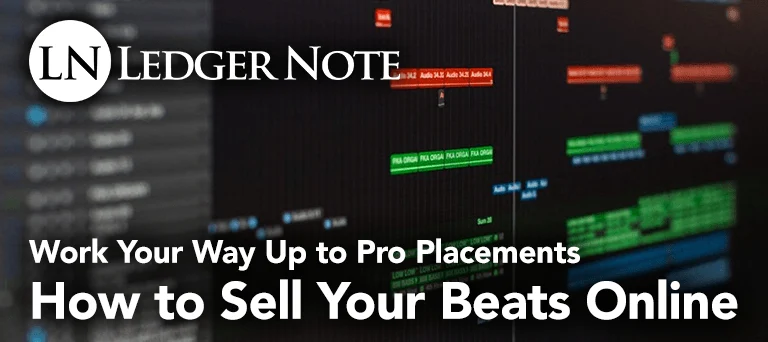
By virtue of being able to make beats, the instrumentalist in the rap and R&B community brings a boatload of skills to the table that provide a sharp advantage to being seen and earning an on-going passive income.
The producer must do everything the vocalist does in order to gain success, but they get the compounding benefit of the vocalist doing it a second time (like marketing campaigns, for instance), while also being nearly indispensable by being able to do what the vocalist can’t do.
The beat producer is the person that knows music theory and has an ear for what sounds good and is popular, doubling already as a record producer. The producer also is already an accomplished studio and recording engineer, and likely a passable if not fantastic mixing and mastering engineer.
All of these talents offer a unique position to the beat maker if and only if he or she can gain exposure and build a reputation and begin climbing the incremental ladder of achieving better and bigger beat placements and higher profile records.
Have no fear. Today’s guide discusses every angle of the process, starting with the act of selling and then looping back to the beginning to understand the market, the community, and the marketing behind a snowballing career as a hip hop instrumentalist.
Since you’re here reading, it’s probably the case that you already have a catalog of beats you’re ready to sell. So let’s jump right into the ways to make that sale and get paid. This is how to sell beats online and climb the ladder.
How Do I Sell My Beats Online?
Almost everyone is selling beats online. Nobody is shopping their mix CD’s around to A&R’s any more. Music is a digital entertainment industry so that’s just the direction it’s gone. This is great for the independent beat maker because it levels the playing field tremendously.
The only thing you’re lacking at this stage is connections, and we discuss that below. But for now let’s look at the two main ways to sell beats online.
Online Instrumental Stores
There are a whole slew of music and sound effect stores on the internet now serving the film, music, and video game industries. But many exist who have their full focus explicitly on the hip hop community.
That’s where you want to be if you want to take the approach of casting a wide net. Now, don’t fall for the mental trick of thinking it’s one or the other. You should be taking all of these approaches at the same time.
The advantage of selling with a store like this is that they’re removing an entire element of the game for you (in exchange for a commission on each sale). They already know how to sell beats online, they just need your beats to get it done. It’s a win/win scenario.
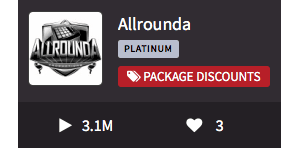
They’re out there hustling a fan base and marketing their store in order to make sure you get the sale, because if you don’t, then they don’t get paid either. So it’s in their interest to make sure as many eyeballs and ears are window-shopping beats on their platform.
For instance, take a look at the Airbit marketplace, pictured above. They’re working hard to build a website infrastructure to stream beats to potential buyers and make the purchase as frictionless as possible. They’ve recently re-branded from being myFlashStore and are going all out to make sure your beats get heard and sold.
The nice thing about these stores is they basically manage your inventory for you, handle customer support for you, pass contracts around, and offer leasing and exclusive options, and mainly that they bring the customers to you. The downside is you have to give them a cut, but it’s absolutely worth it in the time you save.
Grassroots Forums & Communities
This is something you’re likely already doing. Most of us are forum junkies that like to take part in battles and contests, get feedback on our beats and mixes, and relax with likeminded artists. The thing with these communities is that almost every artist that strikes it big and signs a major label deal comes out of one of these.
You may not hear about them until after the fact, but there’s a bunch of us out there that are saying “Hey, you know that guy with the big hit this summer? I used to chat with him every day.” If you’re lucky you already did a collaboration.
My point here is that if you align yourself with the right people early on in your networking, there’s a chance that they hit the big time later and bring you along in some capacity.
But even if that doesn’t happen, these communities are full of people all attempting to do just that, and they need a ton of instrumentals in the meantime. By being a big fish in a small pond, you not only can guarantee yourself a stream of sales, but you immediately become a signal in the noise that is the internet.

Consider a community with a million members. They might have 1000 producers that are better than you, but nobody knows who they are. But everyone knows your name, because you’re the best beat maker from a different community.
They don’t know or care that it’s a smaller group, they just know your name and that’s all that matters. Frankly, the music game is mostly about marketing rather than skill.
Tips for Selling Beats Online
Before we talk about reputation-building and marketing, let’s look at some actionable tips that can aid you right now. There are some tricks from the classical marketing world, the online universe, and even some that are only applicable to beat production. Let’s run through these:
Quality Over Quantity – If you have a library of beats for listeners to browse, don’t toss all of them up. Put your best foot forward to draw as much attention as you can to your top work without overwhelming the would-be buyer.
Make sure they hear what has the best chance of being sold. You can constantly trim off older, less good, beats and use them as freebies for promotion or as cheap leases.
Re-Target Past Buyers – It is unbelievably easier to sell a second beat to someone than to find a new buyer. Make sure to keep in touch through email marketing, social media, or the forums so you stay in their minds. Offer discounts and incentives to past buyers to get them to commit again. We have more ideas below about these incentives that work like magic.
Tag Team the Chorus – You can make life even easier for the buyer by doing part of their job for them. Try providing choruses on some of your beats and see how it works out. You can team up with a singer or even a DJ who can add scratches and vocal chops.
You can even offer to use old lines from the rapper’s previous songs or from the current song once they record their parts. This happens in major labels more than you think. Consider all of the rap songs with R&B choruses and you’ll realize how many were sold that way.
Beat Naming Conventions – When you list your beats on a store like Airbit, keep the names short and easy to remember. Better yet, make sure they’re descriptive of the feel of the instrumental. Consider adding the name of a similar sounding artist or producer. Here are a couple examples:
- Summer Guitar w/ Female Chorus [Ja Rule & Ashanti]
- Atlanta Nightlife [Drake]
- Dark Trap [Juicy J / Ace Hood]
Be The Luxury Choice – You don’t need to spend the time offering stems, tracked out parts, or Pro Tools projects for free beats or leases, but what you can do is offer a pre-mixed uncompressed wave file instead of a lower resolution MP3 like your competitors do. It costs you nothing and takes no extra time to associate yourself with being in a higher tier of quality and professionalism.
Treat Exclusive Buyers Like Royalty – (Because they’ll probably bring you royalties). Make sure that at the least you offer stems that can be sent to a professional mixer. Better yet, offer the full Logic Pro or Pro Tools project so the beat can be rearranged and then mixed and mastered.
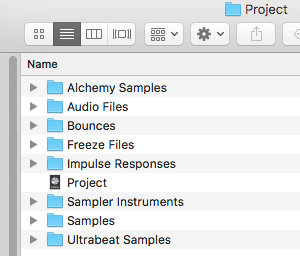
Go the extra mile and upload a zip file for immediate download if possible. If not (and if so), send a USB stick or hard drive in the mail for them to use and archive for later. You want this available in case they get asked to create commercial or movie sound segments.
Know Your Buyer – Don’t be afraid to deny sub-par artists. People want what they can’t have, and nothing says ‘elite’ like being willing to turn down money. Your reputation can be dragged down if your beats land in the wrong hands.
But there’s a lot to be said for being the producer who is picky about who he or she allows to rap or sing over their beats. It’s like the rapper who does collaborations with everyone in order to be heard; if you flood the market with too much supply, your demand and reputation will drop.
Offer Packages – When you can, offer a 2 for 3 beat deal, or offer a bundle where you’ll mix the rap vocals into the beat for the client. This is a great way to earn more income and work with talented clients that can’t afford a professional presentation without your package. You can always offer mixing as a standalone service as well.
As you climb the ladder and come in contact with busier, more experienced clientele there will be unspoken expectations that you may not be aware of, but nonetheless need to be doing. There are plenty of artists and businessmen who will simply abandon working with you if they realize they’ll have to chase you around and coach you on how to provide them with the proper materials.
You need to anticipate being successful and start making these steps a part of your beat-making routine. You can learn more about these unknown factors that can potentially sabotage you in the future by reading our previous music production tips discussion.
Should I Sell My Beats Online as Leases & Exclusives?
This is the big debate and not one anyone can settle for you. You have to be realistic when weighing the balance between becoming a big shot producer and making money. Let me explain what I mean…
The Pros & Cons of Leasing Beats
- You can have multiple earnings from each instrumental
- But each of these earnings will be a lesser amount than an exclusive, by far
- Leasing instrumentals is seen as less professional on the buyer side
- You will attract lesser known clients while being ignored by the best
- Once a beat has been leased, it is less desirable as an exclusive
- There are exponentially more possible customers for leasing
The Pros & Cons of Selling Exclusive Rights
- Each sale provides a much higher earning but can only be sold once
- You usually need some reputation and marketing efforts to achieve this
- It’s seen as more professional and the name-dropping of higher clients can help you attain even better ones
- You can open the door to network with important artists, possibly collaborating with them on your own projects
- You have a real chance to begin earning a passive income through publishing rights and royalties
- You’ll begin to be tapped to create custom work in the style of specific artists
You have to think of yourself as on one hand as a brand that can be ‘cheapened’ by association with lower-value artists, and on the other hand, you need to eat and earn a living. There’s not much a balance to be had between the two.
It’s feast or famine a lot of times. It’s wise to have other forms of income in the meantime so you can play the game strategically instead of desperately.
How to Sell Beats: Pricing Tips
Before we jump right into pricing scenarios, you need to have an understanding of the two markets available to you, as mentioned above. You have your instrumental marketplaces and your grassroots communities.
Each will tolerate different pricing schemes and ownership methodologies. They also have different needs you can emphasize to help make the sale.
Where to Sell Your Beats Online – Leasing vs Exclusives
If you go and collect data across all the various beat selling websites, you’ll get some fun data but it won’t be applicable. First off, you’ll be following trends (data made less accurate by copycats that receive little to no sales).
You’ll also be comparing yourself to producers at various levels of reputation with no context for who their buyers are. You need to worry about your specific demographic, within which you’ve built a reputation.
The best place to start is within your online forums and social networks to get an idea of the standards established by producers focused on that group of rappers and singers.
You can cross-reference these numbers against these instrumental stores and you’ll likely find out that your demographic is more than willing to pay an exponentially higher price to someone they’re familiar with than a stranger on some beat marketplace. This is the power of marketing and reputation.
The guy producing for the most skilled and popular rapper on your forum can fetch multiples more sales at a higher price from people looking to climb the social ladder of that small pond than he ever would tossing his tracks on a marketplace where nobody is familiar with his accomplishments.
The logical conclusion is to place beats with lease options on those instrumental marketplaces, and the more the merrier. The exclusives should be placed on their own website where there is no distraction by other producers competing for the same attention, where the visitors are there because they’re interested in your work and not just window shopping beats for fun.
This website is where you will boast your accomplishments, collaborations, mixing services, package deals, discounts, and the like. Anything to boost confidence and help make the sale to a party that is already interested.
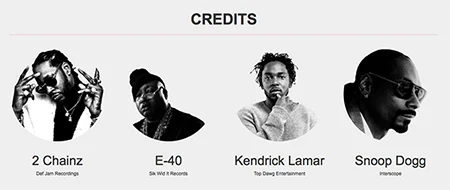
That’s how you get it done, combined with the ‘Beat Selling Tips’ listed above.
How to Price Your Beats Online
The first thing you have to remember is everything here is variable. Supply and demand change constantly as does the tolerance of your micro-demographic to pay a certain price. All of this can be influenced by reputation and marketing, and we’ll show you how below.
But my point is that you need to always be testing your prices and placing them at a price-point that achieves your main goal, which is either to maximize your earnings or to increase your reputation. Those two goals can often interfere with each other.
Instrumental Marketplaces
Let’s look at the marketplaces first. Sure, you’ll have some exclusive options for your leased beats, but personally I wouldn’t mix the two.
On the marketplaces I would only feature leases and emphasize the understanding that rappers can have you create customized beats similar to the leases or look through your exclusives on your own website, for a premium of course.
These marketplaces should be entirely about volumes of sales from lower budget artists, while raising your profile and brand within the eyes of the overall rap community. Your goal here is to create a steady stream of income while gaining visibility among other artists.
Think of it as ‘passive marketing.’ The scenario you want to create is one where a lot of smaller artists are using your leases and giving you credits and spreading your brand name.
You want them bragging about their association with you, while everyone else in the professional community realizes they’re using leases. On the off-chance that one of them rises to the next level and gains notoriety, you can then brag about your association with them.
But until then, don’t advertise their names. You want to position yourself higher than the common riff-raff out there.
As far as prices go on the marketplaces for leases, you can see patterns arising. You don’t want to stray too far out of the acceptable bounds of pricing in each marketplace, but also don’t undersell yourself.
Just remember, these are leases that you can monetize over and over, so lower prices are okay. They come packaged with the marketing benefits for you mentioned above, so some of the payment is a non-monetary type.
For non-exclusive, leased beats, you’ll find prices dangling around (in USD):
- ~30% listed at less than $20
- ~20% listed around $20
- ~30% listed around $35
- ~20% listed around $30
- And the various outliers at higher prices
Some of you may be thinking that these prices are absurdly low and some of you may think they’re fantastic. Even if you feel you’re better than that, it won’t hurt for you to use these marketplaces to build income and a reputation.
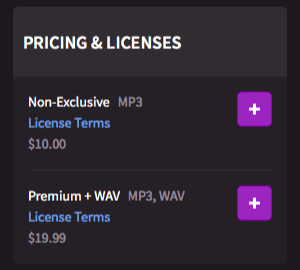
Later, you can re-brand your leased beats under a different name or change your main production company’s name, while allowing these leases to continue to exist and earn you some side-cash. You can later disassociate yourself from them if you feel you’ve risen to a stage where they damage your reputation.
Don’t attempt to rebrand until you have networking connections and upcoming collaborations with artists that can immediately make your new brand relevant.
Exclusive Private Sales
So you’ve loaded up the marketplaces with lots of lease options for your older beats that followed old trends or don’t represent your current skill level. You’re getting some sales here and there but you’re getting outreach from private clients who want to peruse your private collection of exclusives or want you to mimic another beat that already exists out there.
Rightfully so, you should earn a premium on your best work as well as on custom work. You’ve set up your own site with a custom music player or a private SoundCloud account, for example, and you’re ready to entertain these offers. Now you have to figure out how to price them.
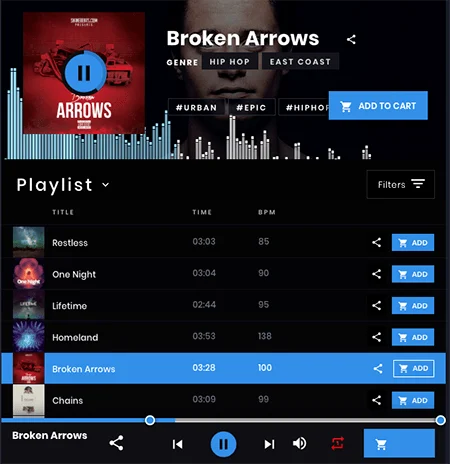
By now you’ve felt out your tight-knit demographic and community and know the amounts other producers are able to sell beats for. Don’t be afraid to add a percentage to that amount so you can negotiate downwards.
Most anyone with the buying power that’s serious are going to negotiate with you, so create that wiggle room right off the bat by listing a bit higher than you’re comfortable selling for.
During these negotiations, always mention package deals like 2 for 3 or a 20% discount on the purchase of two beats. Also mention your mixing services if you have them. Upsells are easy money because you already have a guaranteed customer on the hook.
Don’t be too eager with these deals, because they’ll cheapen your work in the eyes of the buyer. Price and confidence in them is equated to value, so don’t budge too far. Be ready to say no if you have to.
When you first begin selling exclusives, you may start with a lower price until you seed your brand amongst the better artists of the community. You can even privately reach out to the popular artists to provide a beat for free for their next free promotional song or hopefully land on their next album.
Then the lesser artists will begin approaching you for purchases. You can start with a lower price until you hit some arbitrary number like 5 sales, and then raise your prices until you meet resistance. That’s how you feel out your demographic and handle supply and demand.
Now, eventually you’ll max out your capacity for that market. You won’t be too busy because you’re not selling cheaply to every single new rapper out there, but you’re still earning well because you’re selectively selling to more reputable artists at a higher price.
At this point, you can use your reputation to launch yourself into another similarly sized community. You can keep up this horizontal growth forever until previous artists strike it big or until you do. And if nobody does, you’re still steadily increasing your regular income and getting better at making beats.
As far as pricing goes, it’s extremely variable and you don’t want to base yourself on what people are doing on the beat marketplaces.
Anything still listed on a marketplace with an exclusive option with a price means they did not get a sale, so the data is pretty iffy.
From my own time doing this and watching it done, you can expect, in small communities, the lowest level producers to fetch prices as low as $25 to $50 for exclusives and the highest level beat makers to earn from $150 to $500 per beat.
In larger communities where the fanfare is bigger and artists know they can get a return on their investment, beat sales can reach as high as $5,000 per exclusive and more.
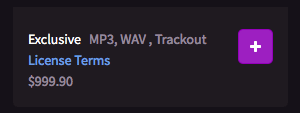
At that range, you can also expect to start getting background music placements in TV shows and commercials, so always save your projects so you can make 10 second and 30 second custom spots on demand. From there, it’s all about networking your way into bigger and better projects.
Everything is about referrals in this industry past a certain point, so get networking and leveraging your reputation.
Building a Reputation as a Beat Producer
Now that we’re past the pricing and selling conversation, we can talk about how to attract clients and create a demand that allows you to command higher prices.
We mentioned a lot of general concepts above, especially regarding dominating ‘small pond’ communities and leveraging that to climb to bigger ponds, but here we’ll get specific about the exact tactics you can use to gain notoriety among those who do know about you, and to gain an even larger general awareness about your beat brand.
Use Audio Tag Watermarks – Create an audio tag that is the name of your production brand. There are random songs where you hear the same names pop up at the start like J.R., Maybach Music, Red One, etc.
These are producers or production companies watermarking their beats to spread their name. You can do this too, to all of your leases and free beats, and to your exclusives if the artist is okay with it. It’s not seen as bad practice these days at all, so don’t be shy.
Offer Free Beats – One thing you can do on your own site for exclusives is to offer a handful of free beats. You can post these on video and music streaming sites, forums, beat marketplaces, and more, all linking back to your main site.
The idea is to raise awareness of your website so people know it’s there for later when they’re ready to purchase an exclusive. And having three to five free beats for to use, with no strings attached, is a great way to give back to the community. Amateurs will remember that when they rise in the ranks and need custom work done. Limit the number of free beats you give out. Don’t cheapen your brand.
Know Your Buyer – We talked about this above but I want to reiterate this point. You do not have to accept money from everyone who has it. Working with a horrible or controversial artist can hurt you more than help you. You should investigate each buyer to some degree and make sure they meet a certain criteria of skill and quality.
Producers climb the ranks by using artists like stepping stones. Always try to climb upwards. It doesn’t hurt to help an artist friend out and pull them along with you, but you can’t save everyone, nor should you try if you want to protect your reputation.
Make Remixes – Acapella’s and vocal stems can be found by the thousands. Making remakes of classics and new hit songs is a great way to spread the word of your brand, especially on services such as YouTube and SoundCloud.
You can release groups of your remixes as free promotional albums as well. This is a great way to practice your craft and blow off some steam, too. Read the next tip to understand the legal ramifications of doing this.
Be Careful with Sampling – Don’t use samples that aren’t in the public domain or that you haven’t already cleared the rights for using. The fastest way to burn a bridge is to cause your client unanticipated legal trouble because you were careless.
If you know how to sample well and want to exploit the skill, consider only using copyrighted samples on free promotional material, making sure not to use a substantial amount of the original recording and ensuring it is a truly transformative work. Fair Use can protect you legally, but doesn’t guarantee you’ll stay out of a lengthy and costly court battle. Tread carefully.
Be a Big Fish in a Small Pond – I wrote novels about why to do this in the discussion leading to this point. Being a brand is all about snowballing marketing into a bigger and bigger reputation.
Competing against a thousand other producers is silly when you can compete against 10 or 20 somewhere else. Then when you circle back around to a bigger pond, you’re already near the top thanks to your previous, smarter efforts.
Piggyback on Hot Trends – Does everyone want that Island sound? Make some beat like that. Is everyone now into G-Funk again? Make a few of those.
This is a great way to fill demand, fill your wallet, and gain more skills. You can also wiggle your way onto a bigger artist’s album if they need an instrumental like that and you’re the fastest one there ready to get the work done.
Make Beat Making Tutorial Videos – There are two huge validators for potential beat-buyers: Seeing other producers look up to and respect you, and seeing mass public validation like lots of views on videos and listens on audio streams.
One way to kill both of these birds with one stone is to make tutorial videos and promote them. It shows your skill, your work flow, and humanizes your brand, making it a little more interactive, which is good.
Do Favors to Climb the Ladder – You don’t have to wait for an artist to buy an exclusive. You can reach out and offer them freebies, provide help on their promotional songs, make trades, and more. You only need to collaborate once in public to start being able to name-drop them.
I don’t mean to be annoying with it either, but to use it professionally like “As Seen On…” this and that record by big time artist so-and-so. You can use this to validate your quality and value to other artists to further your climb.
Get Away From Stock Sound Fonts – The unfortunate reality is that most professionals recognize the stock sound fonts from even the best DAWs. When it comes to beats, we’ve all heard the exact same set of sounds on a million FL Studio beats, even from the days when it was called Fruity Loops, and we tend to immediately dismiss that beat and producer.

You can buy downloadable expansion packs, CD’s, and even hunt for other free sounds, but the best way to solve the issue is to buy a MIDI sound module from one or several of the popular production keyboards like the Korg Triton, Roland Fantom, or Yamaha Motif.
Never Be Negative or Speak Outside of Your Specialty – Don’t engage in internet arguments, don’t be judgmental and mean to upcoming artists, and don’t let anyone see you being foul and disrespectful. Image is everything and you can lose connections you never knew you were about to have.
The internet never forgets a thing, so just don’t do it. And don’t start yammering about politics and other heated topics that can ostracize half of the buyers you were about to get. If you’re not being nice and helpful or neutral, keep your mouth shut. Protect your brand at all costs in this way.
Consider a Compilation Series – By reaching out to upcoming artists and tapping them for appearances on your own compilation, entirely produced by you, they will turn around and promote the album to their entire fan bases.
This allows you to keep the control as well. When you release volume 2, you can leverage the success of the first one to obtain collaborations with even higher profile artists. Keep growing this way until you ride it to the top like DJ Khaled and Lil Jon.
That’s How to Sell Beats Online…
As you can see, something as simple as wanting to know how to sell beats online can encompass quite a bit of work and information you didn’t realize was not only applicable but necessary.
You know as well as the next person that talent is a fraction of the game. Everything else is in who you know and how good you are at marketing. The reason there are so many starving artists is because none of them are willing to be businessmen as well.
If you want to sell beats, you better be as eager to build a brand as you are in making instrumentals. This shines a light on the path, but you still have to walk it yourself. Good luck and happy beat-making!